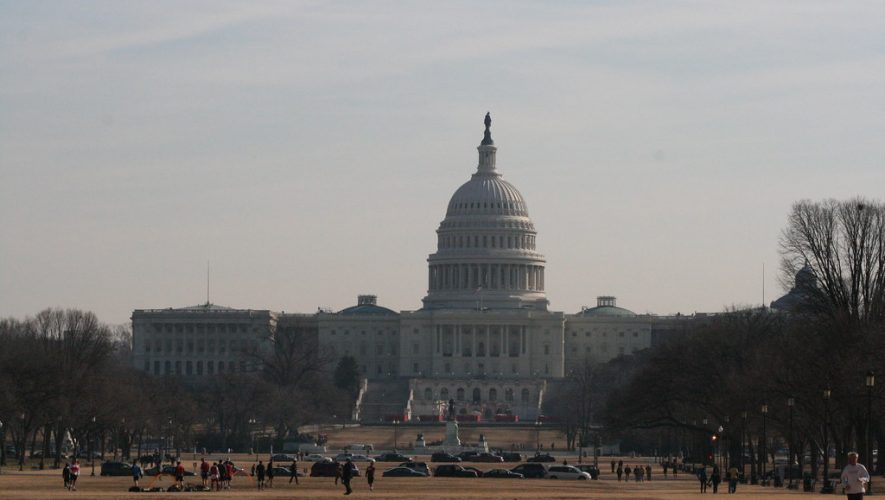The Elie Wiesel Genocide and Atrocities Prevention Act of 2018 (S.1158) not only condemns genocide and acknowledges its threat to national and international security, but also establishes the United States’ responsibility for intervention and strengthens the “government’s capacity to prevent, mitigate, and respond to such crises.” The original proposal established a response to genocide, but after revision, only condemns genocide with no provisions to actually prevent atrocities.
S.1158 is a heavily edited version of H.R.3030, a bill introduced by the House of Representatives on July 17, 2018, that eventually died on the Senate floor. H.R.3030 was assigned to the House Permanent Select Committee on Intelligence and the House Committee on Foreign Affairs with a sub-committee assignment of Africa, Global Health, Global Human Rights, and International Organizations.
The bill that was introduced on June 22, 2017 was substantially pared down by the time the House voted on the act almost a year later. While most of the substance was preserved, many pertinent details were removed. The Complex Crises Fund, which would have provided the resources to respond to global atrocities, was outlined extensively in the initial bill, with provisions regarding the fund’s establishment, purpose, and limitations. In H.R.3030’s final form, the bill mentioned the Complex Crises Fund briefly as one of many mechanisms for funding atrocity prevention and response, with no provisions outlined for its implementation.
On July 17, 2018, the House passed H.R.3030 406–5, with seventeen members abstaining. It was never voted on in the Senate despite being received and read twice. The bill was placed on the Senate Legislative Calendar under general orders and it died when the congressional session ended.
But the bill’s death in the House did not kill the legislation. As is typical, the original form of the bill remained under active review in the Senate, where it was introduced on May 17, 2017, in the same form as the original H.R.3030. This provided another opportunity for substantive anti-genocide legislation. But the Senate Committee on Foreign Relations made even more substantive changes than the House had.
The first two sections, which in part established a task force mandated to produce an unclassified report evaluating the efficiency of US foreign policy and recommending further action, were struck entirely, as was the majority of the third and a substantive portion of the fourth. These changes resulted in an almost entirely ineffective bill. It was cut from ten pages to four, meaning that many specific guidelines and regulations were removed. The resulting document no longer outlines an American response to genocide and other atrocities, but rather condemns genocide with few guidelines for meaningful response.
The most substantial addition to the document was that of Section Seven, which states that “nothing in this act shall be construed as authorizing the use of military force.” After the reintroduction of S.1158 in the Senate, there was only one amendment made—to strike a clause establishing the policy of the United States to “respond to the drivers of atrocities and violent conflict.” All of the amendments made to the original bill diminished its enforceability and absolved Congress of taking action to prevent genocide abroad.
Regardless, S.1158 was passed unanimously by the Senate on June 26, 2018, then adopted by the House on December 12, 2018, by a vote of 367–4, with sixty-one members abstaining. Ultimately, S.1158 was not passed to establish a policy against atrocities or even to condemn genocide. While factors such as the rise of hate crimes against Jewish people during the Trump administration and the historical precedent of ignoring modern genocides and antisemitism in the US prompted the legislation’s creation, the bill passed because of the political backlash congress-people would receive if they voted against condemning genocide. The reality of said political backlash resulted in the legislation being simplified to the point that no substantive changes were made to America’s stance on genocide.
One of the primary reasons for S.1158’s development is the resilience of anti-semitism in the United States. While some historians argue that antisemitism is inherent in the Christian tradition due to the controversial history of the Judeo–Christian relationship, elected leaders and popular figures have also promoted anti-semitism for generations.
President Franklin Delano Roosevelt’s anti-semitic views shaped his World War II immigration policies. From 1941 to 1945, unduly harsh standards for entry resulted in less than a quarter of the quota for German Jews (26,000 per year) being filled. An applicant could be denied entry if they were leaving behind a close relative in Europe, as it was argued that the Nazis would threaten the relative to force the new immigrant to become a spy for Germany. Other American presidents have also displayed anti-semitic beliefs. Harry Truman made statements such as “the Jews, I find, are very, very selfish,” and Ronald Reagan called them “very aggressive and obnoxious.”
Elected officials are not the only group to take advantage of anti-semitic rhetoric. Henry Ford used his self-funded newspaper, the Dearborn Independent, to denounce anything associated with Judaism. Throughout the mid-to-late 1900s, while also attacking other minority groups, the Ku Klux Klan attacked Jews and spread anti-semitic propaganda.
Under the Trump administration, anti-semitism has risen. There has been a nearly 60 percent increase in hate crimes against Jewish people since his election in 2016, with over 780 cases in the first six months of 2019 alone. According to the FBI’s hate crime statistics database, of the 1,564 religiously motivated hate crimes reported in 2017, 938 were explicitly anti-semitic in nature, more than triple the next most targeted group.The history of anti-Jewish rhetoric by some of the most notable leaders of the United States and resurgence of antisemitism in the modern era is one of the major reasons bill S.1158 was introduced and passed.
While a tradition of antisemitism certainly spurred S.1158’s creation, the historical context for the creation and passage of S.1158 spans beyond the recent surge in anti-semitism. The United States has received major backlash from its citizens and international organizations for its inaction in preventing or intervening in various genocides, particularly the Rwandan Genocide.
Rwanda was colonized by Germany in 1884, and the German government created the ethnic groups of Tutsi and Hutu based on who appeared to be more “white” based on various arbitrary factors. Inequality between the groups grew, with the Tutsi minority holding most of Rwanda’s wealth. During World War I, Belgium took over the colony, solidifying the ethnic groups created by Germany and administering identification cards with group membership. In 1960, Belgium left due to Hutu aggression, creating a Tutsi government in its wake. The Hutu overthrew the Tutsi government in 1990, leading to a resurgence of the Rwandan Patriotic Front, a French-backed political party. The genocide, perpetrated by Hutu extremists against Tutsis and political opponents, resulting in the death of over eight hundred thousand Rwandans, yet the US did not respond due to a change in policy after US soldiers were killed in Somalia in 1993.
There have been multiple genocides since, spanning from Darfur in the early 2000s to the ongoing Rohingya Genocide. With the persistent worldwide threat of atrocities, S.1158 was intended to serve as a message to the international community that the United States would no longer be complacent when it comes to genocide or other atrocities. The original bill outlined real responses and specific steps for preventing genocide. By the time it garnered near-unanimous support in both houses of Congress, edits and amendments had turned a bill of decisive action and genuine change into a defanged, controversial gesture.
S.1158’s only true action is the promotion of “atrocity prevention and response through interagency coordination, such as the Atrocities Prevention Board,” that will monitor international atrocities and advise Congress regarding appropriate action. The final document primarily restates the United States’ anti-genocide stance which was previously established internationally through the Responsibility to Protect doctrine that passed unanimously in the 2005 United Nations World Summit.
While the domestic statement of anti-genocide policy is legitimate, S.1158 fails to achieve its original goal of creating true parameters for addressing genocide. Members of Congress diluted the bill to ensure that they could vote for it without forcing the United States into military and diplomatic actions abroad.
Legislators did not want to be associated with voting “nay” on a bill against genocide, so they made the document inconsequential and incapable of promoting decisive action. The United States has routinely failed to swiftly intervene in mass atrocities, resulting in millions of potentially preventable deaths. However, the US has previously been criticized for intervening in conflicts abroad. Regardless of the action the government chooses to take, it will always receive backlash.
S.1158 could have streamlined international action against genocide, legitimizing the policy globally and preventing countries from ignoring or promoting genocide due to fear of retaliation from the world’s strongest military. A tangible American mandate to intervene against genocide wouldn’t just save lives, but could also prevent mass atrocities before they even begin.



